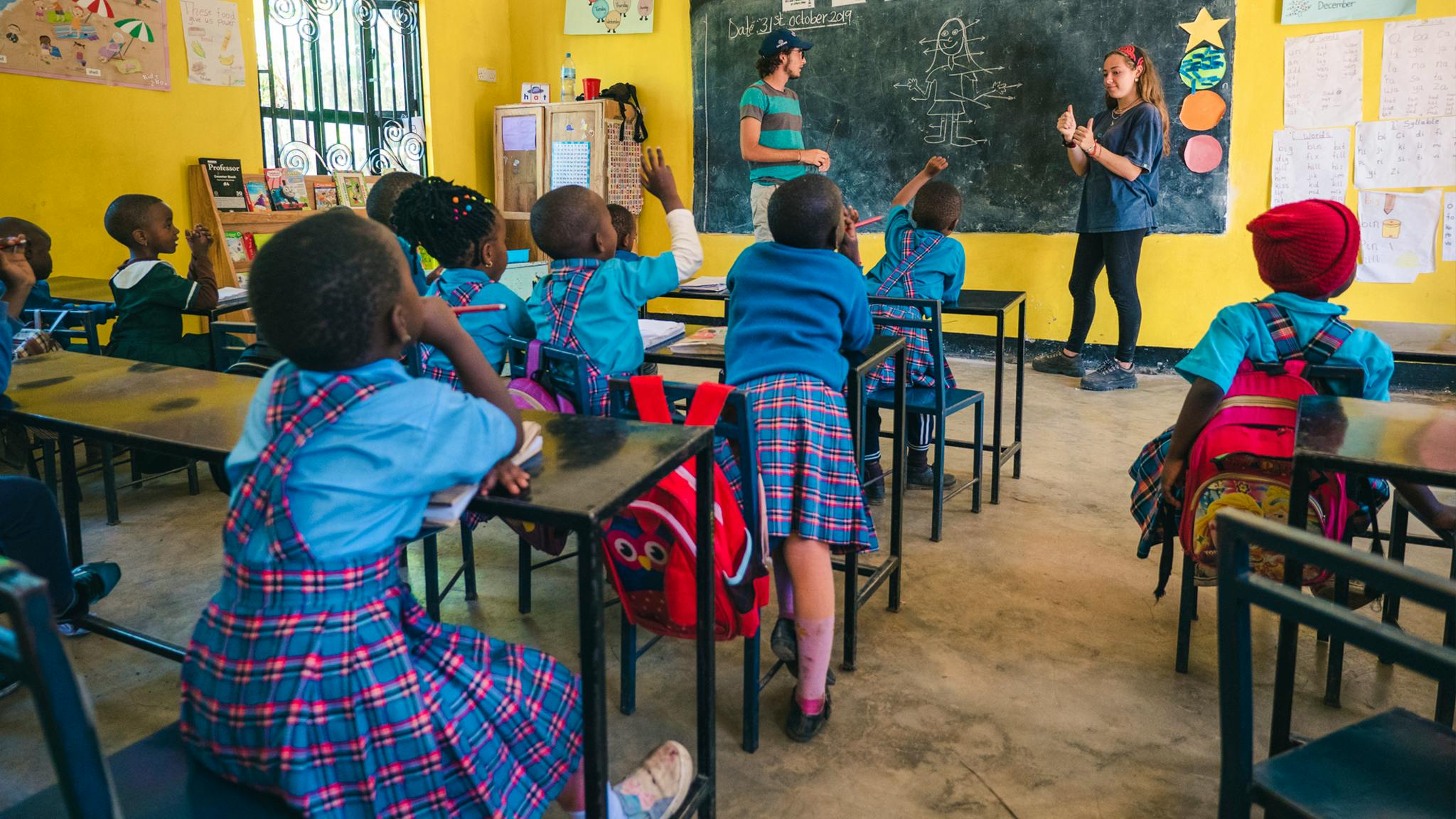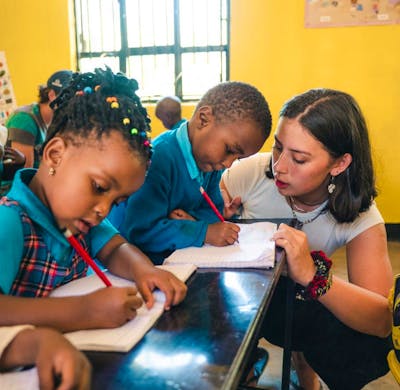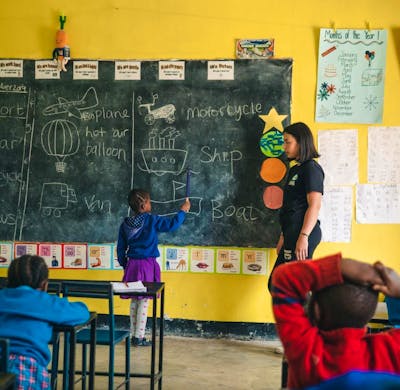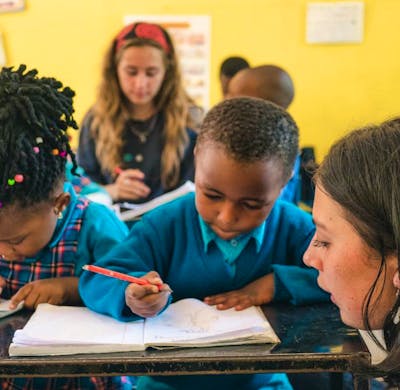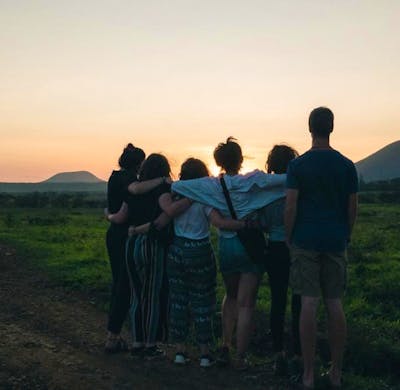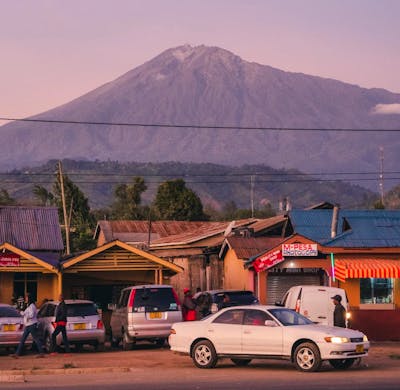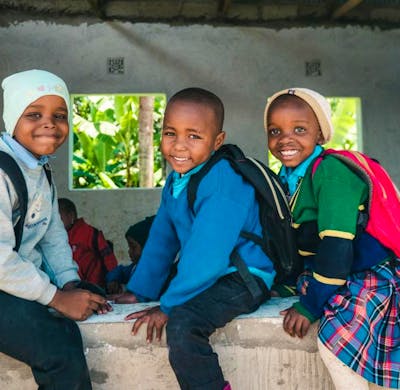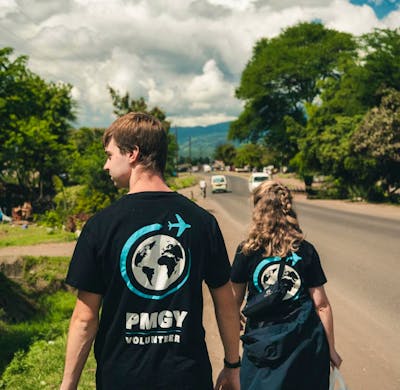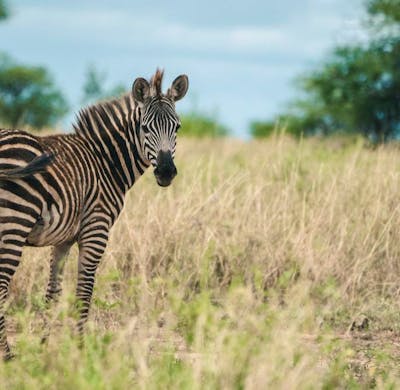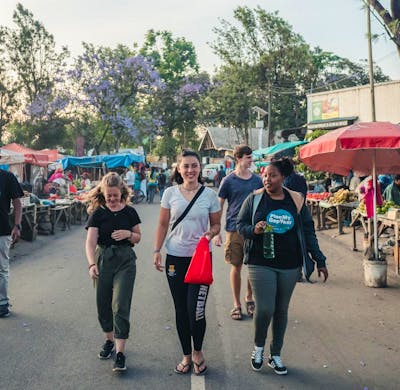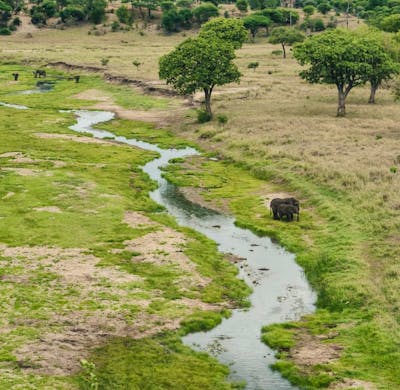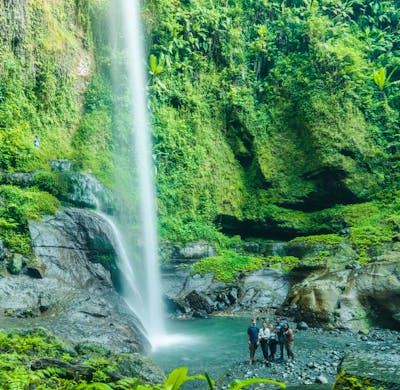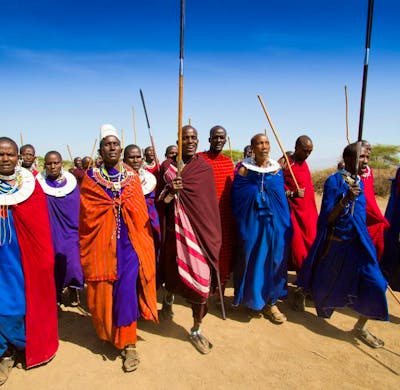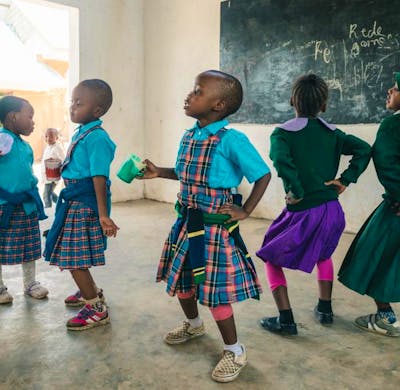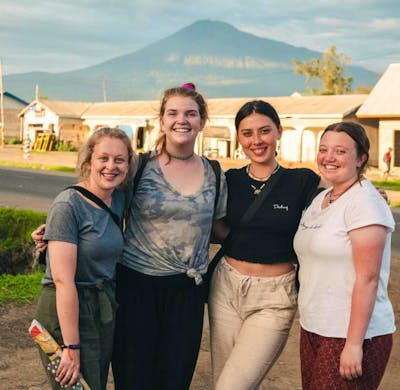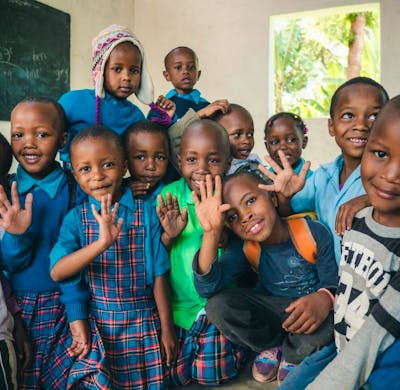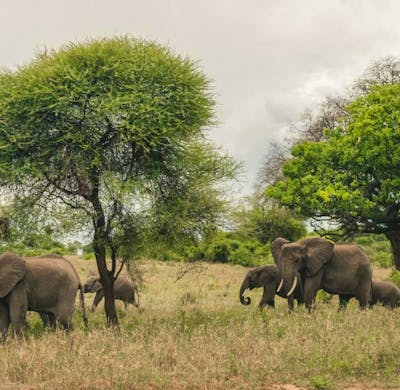As a volunteer teaching English in Tanzania, you will work to encourage students to develop a skill that will help them to achieve their future goals. Conversing with fluent, native English speakers greatly improves their language skills, essential for future employment. This project, therefore, provides the perfect opportunity for international volunteers to teach English in Tanzania. Develop your leadership skills and make a profound impact on the lives of disadvantaged children in Arusha.
BACKGROUND TO THE TEACHING PROGRAM
Early in this century, there was a large push from the Tanzanian government to get all children into education. This success was largely achieved through a drop in primary school education fees across the country. As a result of this movement, it’s estimated that a staggering 96% of primary-school-age children are now enrolled in a school. However, despite this progress in the education system, the average primary school class consequently hosts approximately 53 pupils to one teacher. This statistic is even more dramatic in rural areas. International aid has also faltered since the global recession. Together, these factors are heightening the concern about the quality of education offered across Tanzania.
To make matters worse, teaching methods in Tanzania are largely based on learning through repetition and aimed at passing exams. This has led to a situation where, though the children can reel off information, they have very little understanding of what they are saying, particularly about learning English. As most secondary school classes are taught in English, this way of learning causes problems later in the education system. For this reason, improving the methodologies of learning can lay the foundation for increased learning potential in later life. In turn, this can improve the employability of Tanzanian students during adulthood.
Over a third of people in Tanzania live below the national poverty line. Education is one of the essential skills for children to develop and is their doorway to a bright future. Tourism is a big business in Tanzania. This means that typically, the ability to speak English dramatically increases the opportunities for young people to gain meaningful employment.
PMGY’s volunteer teaching English abroad project in Tanzania aims to support local schools and childcare centres to maximise their impact. PMGY’s international volunteers working in Tanzania teach children English, Maths and other subjects, whilst transferring skills and sharing cultural perspectives. As a teaching volunteer in Tanzania, no previous teaching experience is required - you just need to be creative and proactive! Our team will help you settle into a role, allowing you to make the biggest impact, and gain valuable skills yourself.
We predominantly support primary schools, however, volunteering opportunities within secondary school locations may be possible upon request. Additionally, many of the childcare projects we support have nursery schools for children of preschool age. In these locations, PMGY volunteers wishing to teach English in Tanzania are also able to assist.
TEACHING VOLUNTEER PLACEMENT EXAMPLES
Good Hope School - This school is located in the area of Ngusero Region in Arusha, which is renowned for its poverty and lack of opportunity around education. This school was founded in 2005 and has a large number of students. Usually, over 1000 at any given time. Good Hope School has a nursery with children aged 3-5 alongside the primary school where the main Teaching placements take place with students aged 6-14 and is located around 15 minutes from both the volunteer accommodation and centre of Arusha.
High View School - This school is located in the area of Mbauda Region in Arusha around 20 minutes from the volunteer accommodation. Founded in 2005 to provide affordable and quality schooling for local parents and children alike, High View School is a hybrid of a nursery with children aged 3-5 alongside the primary school where the main Teaching placements take place with students aged 6-14. There are on average over 300 children attending daycare or school at this location.
During your time as a volunteer in Tanzania, you will be required to think and act creatively and proactively, to ensure that your classes are as enjoyable and productive. You will be playing an important part in supporting local teachers at the school. Many of the students will also benefit hugely from having someone fluent in the English language teaching them in Tanzania.
OTHER THINGS TO CONSIDER TEACHING IN TANZANIA
Return Airport Transfer - Your return airport transfer is not included in your Program Fee. Our local team can help arrange onward transfers to the airport or an alternative destination from the volunteer accommodation. Making specific arrangements once in Tanzania provides more flexibility as plans can often change and participants may be on similar flight plans. The costs depend on your method of transport and your final destination. This can often be split across multiple participants if you are travelling with someone else on the program. It is strongly advised not to travel by public transport or tuk-tuk back to the airport. Whilst this may be cheaper, it is far less convenient and comes with additional safety risks.
Experience - For the English Teaching program, teaching experience is not essential as the mere presence of a native English speaker is invaluable. As long as you are creative, determined and resourceful you can have a constructive impact on the development of the children’s education.
TEFL Course - We encourage volunteers to prepare as much as possible for their teaching program overseas. You can make the most out of your time by completing our convenient, inexpensive and international accredited 60 hour Online TEFL Course. The cost of this course is only 150 USD.
Resources - On the teach English in Tanzania project, resources can be very limited. Volunteers are recommended to bring materials to the project each day to maximise their productivity and day to day involvement. It is therefore important for volunteers to prepare well in advance to get the most out of their teaching English project experience.
Project Locations - Childcare and teaching participants on the Tanzania volunteer program are sometimes based at the same site. In these instances, volunteers will be able to travel together accordingly. At the volunteer project, teaching volunteers will tend to work with slightly older children. Childcare volunteers will work with children of preschool age. Although similar, they each follow different daily itineraries and setups.
It is worth noting that all the schools our volunteers work with are run privately. Tanzanian government legislation does not permit volunteers to teach within government-funded schools. This is even though these establishments often visually appear to require a greater level of support.
Yellow Fever - Recently, the Tanzania Embassy has changed legal requirements for the Yellow Fever Vaccination. The government now states that this must only legally be obtained by:
• Individuals who are travelling from a country with a risk of Yellow Fever transmission
• Individuals who are transiting through one of these at-risk countries for 12 hours or more
However, some participants outside of these parameters have still been asked to show evidence of the vaccination upon arrival in Tanzania. You may, therefore, wish to still obtain this vaccination to avoid any confusion or difficulties upon arrival into the country. To obtain this vaccination, you must ensure you allow yourself plenty of time to arrange this before you go.
There has been a lot of debate on this issue. However, from the PMGY team’s experience, we have always been asked to show proof of our Yellow Fever Vaccination. We therefore strongly advise all our volunteers to do so as well to avoid any complications on arrival.
Weekends - Your project work in Tanzania runs from Monday-Friday and weekends are free. You are welcome to relax and hang out at the volunteer accommodation but most participants will use this time to travel and explore the country. As a result, you can check out our Tanzania Weekend Travel Guide for top tips on how to spend your weekend.
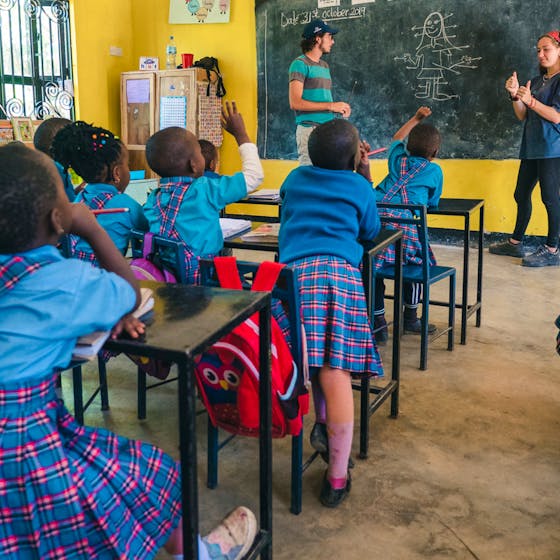
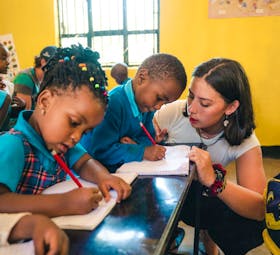
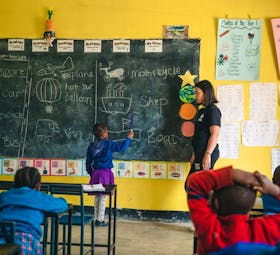
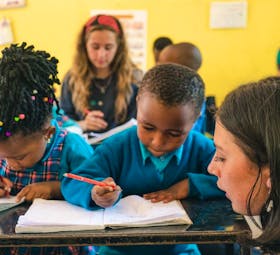
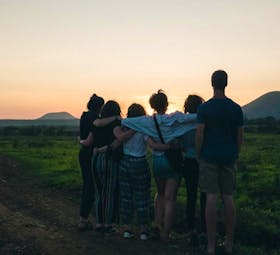

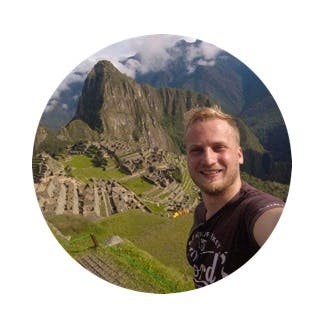
 4.9
4.9

